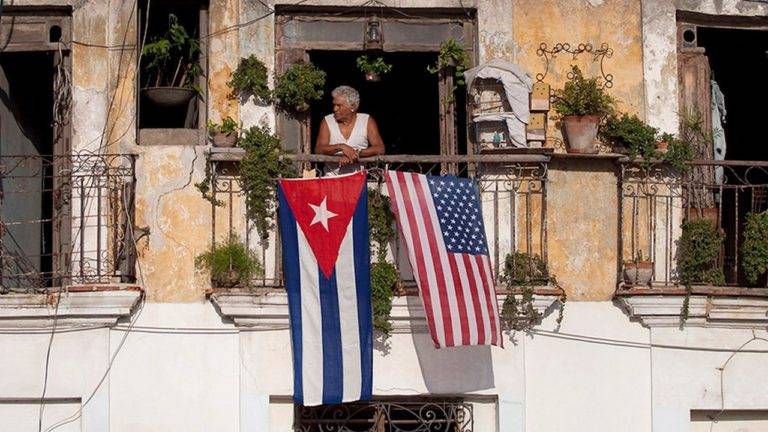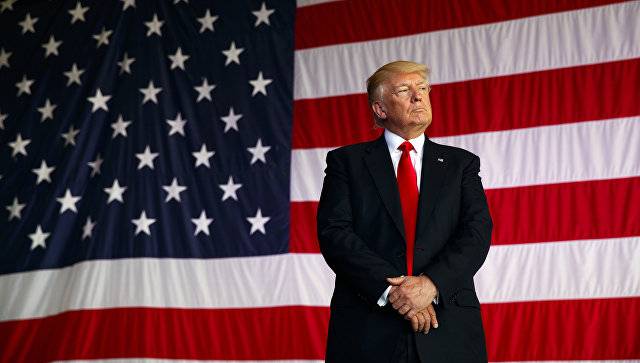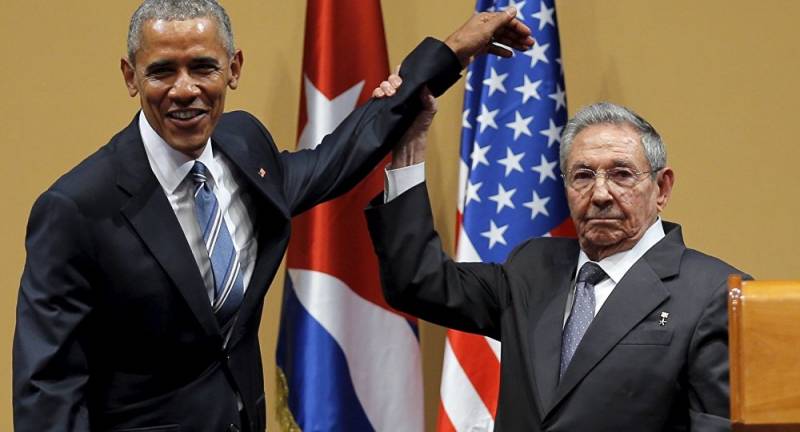Trump vs Cuba. Washington returns blockade of Liberty Island
What should Cuba expect from Trump? The United States has long dreamed of transforming the Cuban political regime. This was directly stated by Trump during a speech in Miami, calling the Cuban regime "communist oppression." So far, the American leadership intends to ban business operations on the island to companies cooperating with Cuban security forces - the army, intelligence and counterintelligence services, as well as to tighten restrictions on US tourist trips to Cuba. Otherwise, the paradox will turn out - the government opposes communist Cuba, and citizens are in a hurry to get vouchers and spend their holidays on unmatched Cuban beaches. It is also clear that Trump's desire to limit business with companies associated with Cuban security forces - the American president fears that the funds will go to the needs of Cuban security forces and, accordingly, to strengthen the position of the Cuban leadership.

Less than three years ago, December 17 2014, then US President Barack Obama announced major changes in US-Cuban relations. Then Obama stressed that the United States draws a line under the “outdated approach,” since hostility only hindered American interests. The president acknowledged that the isolation policy against Cuba did not work. And it was really true. Even after the collapse of the Soviet Union and the entire mighty socialist bloc in Eastern Europe, the US remained “under the nose” of the few socialist countries in the world. The Castro brothers so firmly held the reins in their hands that for almost thirty years post-Soviet stories they could not intercept and even snatch. Despite the isolation regime, Cuba did not think to “die of hunger”, although the standard of living in the country remains very low so far. So there were sincere notes in Obama's words - the United States really didn’t achieve anything with its isolationist policy towards Cuba. Moreover, the Cuban experience is still respected by serious left-wing political forces throughout Latin America.
Even before this statement, Obama shook hands with Cuban leader Raul Castro at the funeral of South African leader Nelson Mandela. This handshake was a symbolic gesture that personifies the relative normalization of relations between the two countries. In March 2016, Barack Obama made a visit to Cuba, met with Raul Castro and gave a joint press conference. The arrival of the American leader in Havana was a clear confirmation of the fundamental turn of American policy towards the neighboring island. It is not excluded that if Obama had replaced Hillary Clinton as US President, the line begun by the first head of state, an African American, would have continued. But trump won - with all the ensuing consequences. He called the course of Barack Obama towards Cuba terrible and said that the agreement with Cuba, concluded by his predecessor, contributes only to the preservation of violence and instability in Latin America.
In fact, Obama’s policy toward Cuba and before Trump's victory in the presidential election caused a negative reaction from the conservative-minded part of the American establishment. Obama could not forgive the "recognition of the communist dictatorship," as the American conservatives define the Cuban political system. The main opponents of the normalization of relations with Cuba are ethnic Cubans, immigrants who live in the United States and constitute a rather impressive diaspora. American Cubans have their senators and big businessmen. Naturally, they reacted extremely negatively to the handshakes with Castro, the visit of the American President to Havana, and other “disturbing calls” that indicated a change in bilateral relations for the better. They can be understood - the “elite” of Cuban immigrants personally suffered from the Castro family, from the Cuban revolution, as they lost their wealth and political influence in Cuba, which she had before the partisans won.
Another anti-Cuban force in the US is conservative American anti-communist policies. The words that Obama recognized the “communist dictatorship” belong to the well-known senator, Russophobe Marco Rubio, and Congressman Mario Díaz-Balart accused the American leadership of “playing into the hands of Castro” and preventing Cuban political immigrants from naturalizing in the United States. From the very beginning of his presidential campaign, Donald Trump positioned himself as a supporter of conservative values and strengthening the influence of the United States in the world and, above all, in the New World.
It is worth noting that the position of Trump as a person towards Cuba was changing very rapidly. What was beneficial to Trump, a businessman, is not needed by Trump, a politician, and vice versa. At the end of 1990, Donald Trump, a successful businessman, sought to invest heavily in the development of Cuba’s hotel infrastructure, rightly believing that sooner or later Cuba would become the main target of American tourists and that could make good money. In an effort to enlist the support of American citizens, oriented to rest in Cuba, Trump promised to develop closer relations with the Island of Freedom than under Barack Obama. But after becoming president, Donald Trump abruptly changed his rhetoric. This is due to the fact that a very influential stratum of conservative politicians is putting pressure on him, as well as the numerous Cuban diaspora, who hates the Castro family and the political and economic system they have built.
Of course, Trump is unlikely to go for a total rupture of relations with Cuba, but their substantial folding is easy to predict. The fact is that Trump is simply not interested in Cuba right now. Isle of Freedom is not interesting to the American leader, like other Latin American countries. Trump stands for the transfer of production to the United States, for limiting the access of Latin American immigrants to the United States, and therefore he is not concerned about maintaining friendly relations with Latin American countries.
Most likely, additional economic sanctions may be imposed on Cuba, especially since Trump has already stated that he does not agree with the position of the United Nations and other international organizations opposing the island blockade. For a long time, left-wing governments, which were in power in many Latin American countries, insisted on normalizing relations with Cuba. Cuba is a kind of symbol of the independence of the Hispanic peoples of Latin America from the dictates of the United States, and this is precisely why it is valuable to other states in the region. The Castro family is also endowed with symbolic meaning. The late Fidel took a worthy place in the pantheon of Latin American heroes along with Simon Bolivar, San Martin, José Martí, Che Guevara. Since now is not the time that in the middle of the twentieth century, Latin American states are trying to make the United States understand the need to revise the policy on the Cuban sector. Obama understood this signal and hoped to strengthen partnerships with Latin American states, including through the revival of relations with Cuba.

But since Trump is not focused on Latin America, he may not satisfy the wishes of the governments of Latin American countries. His predecessor Barack Obama wanted to remove the problem that lies between the United States and the countries of Latin America, and which is a stumbling block. For Trump, this question is not on the agenda. When Fidel Castro passed away on November 9, 25, Donald Trump responded to the news of his death, calling Castro a brutal dictator and expressing confidence that the people of Cuba would come to "freedom and democracy." The American leadership claims that in order to normalize relations between the countries, the Cuban authorities must open markets, ensure freedom of religion and political views, and release political prisoners.
But, despite harsh words addressed to the current Cuban authorities, Trump is in no hurry to break off the diplomatic relations restored under Obama. Most likely, the severance of diplomatic relations will not follow. Saved aviation and maritime communications with Cuba, the resumption of which is also the merit of Barack Obama. Finally, Americans of Cuban descent are allowed to visit their relatives in Cuba and help them financially through remittances. However, while the issue of the possibility of limiting the educational and cultural trips of US citizens to Cuba is being discussed. In addition, Trump canceled wet feet, dry feet, a policy that allowed Cuban citizens who immigrated to the United States to apply for a residence permit in the United States for one year. For a fighter with Latin American immigration, whose image is actively exploited by Donald Trump, this decision is more than natural. Another thing is that it is not very clear how it affects the interests of the Cuban government. After all, the Cuban authorities are not interested in allowing Cubans to freely immigrate to the United States. Much more impressive is Trump's desire to limit the “wild” tourism of American citizens who, in recent years, have rushed to Cuba, attracted by cheap prices and good conditions for recreation. To do this, it will be necessary to more strictly check American citizens who want to go to Cuba - only limited categories of Americans who can explain the purpose of their visit - visiting relatives or scientific research, for example, can visit the island. Prior to this, in 2014, it was decided to allow trips to Cuba for American citizens in order to “human communication”. It goes without saying that this vague category was interpreted quite freely, and tens of thousands of Americans managed to visit Liberty Island essentially for tourist purposes, leaving good money in Cuban hotels and catering establishments.
The response of the Cuban authorities to Trump’s statements about tightening the island’s policy also proved to be very predictable. Official Havana condemned the decision of the American president. As was to be expected, the Cuban Council of Ministers condemned the extension of the economic blockade of the republic, but stressed that such a policy was doomed to failure in any case, since Washington would not be able to weaken the Revolution and defeat the Cuban people.
In turn, Trump’s turn to the resumption of the blockade and the representatives of the Cuban diaspora in the United States did not so unequivocally perceived. In Miami, there was even a demonstration of protest against the actions of the American president. Not all immigrants are representatives of the Cuban elite, “offended” by the Castro brothers and the revolution. For ordinary Cubans, the island still remains home, and when the American leadership takes sanctions against Cuba, people begin to worry about their relatives and relatives left in the republic. According to many Cuban immigrants, toughening the course towards Cuba will damage the republic and worsen the lives of its people.
Negatively perceived the abolition of the previous course towards Cuba and the Russian Foreign Ministry. In our foreign policy department, Trump’s turn was called a return to the Cold War policies and emphasized that Russia opposes embargoes, blockades, sanctions and dividing lines. Moreover, the United Nations and most countries of the world have repeatedly supported the lifting of the blockade from Cuba.
Given the age of the current head of Cuba, Raul Castro, and the existence of a problem with the continuity of power in the republic, Washington, of course, hopes for a quick change in the political life of Liberty Island. Therefore, it is so important for the American leadership to destabilize the political and economic situation in Cuba in order to prevent the socialist system from preserving after Raul Castro’s departure. The very presence of the state, openly demonstrating its communist, anti-imperialist and anti-American orientation, is at the side of the United States the strongest irritating factor, and the change of order in Cuba will definitely be perceived as a victory for any American president who will be in power by that time.
- P P 'SЊSЏ RџRѕR "RѕRЅSЃRєRёR№
- https://news-front.info, https://sputnik.by/

Information